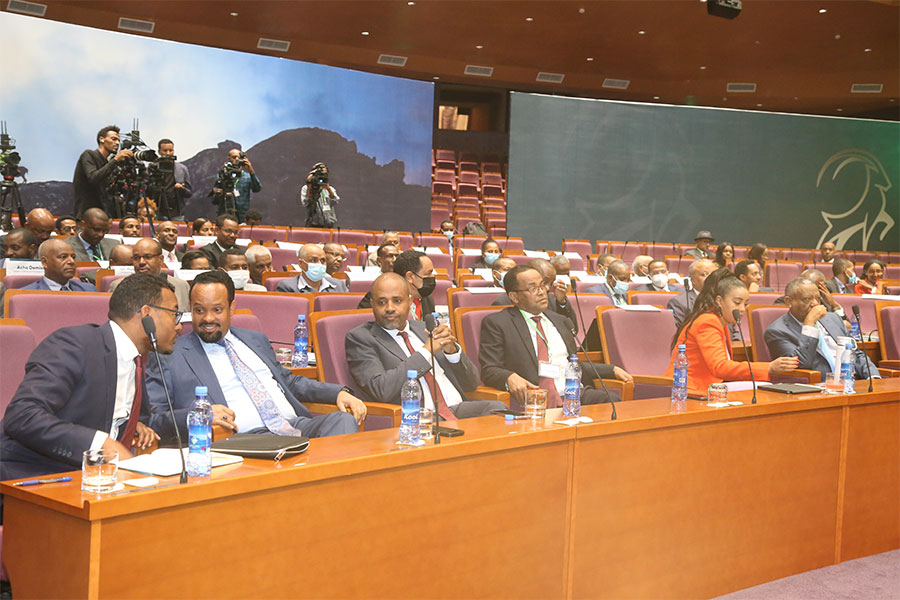
Breaking a century-long state monopoly, the state-owned Ethio telecom S.C. has launched an initial public offering to sell 10pc shares to the public, hoping to raise additional equity in hundreds of millions of dollars.
Unveiled by Prime Minister Abiy Ahmed (PhD) on October 16, 2024, at the Sheraton Addis, Taitu Street, the Initial Public Offering (IPO) seeks to raise 30 billion Br (approximately 281.4 million dollars based on last week's central bank rate), valuing the company at a robust 300 billion Br. The partial privatisation opens the door for the public to participate in one of Africa's most lucrative yet untapped telecom markets.
For over a century, Ethio telecom held a monopoly over Ethiopia's telecom sector. The company boasts a 94.5pc market share, serving 78.3 million subscribers. Its dominance is rooted in extensive infrastructure, including over 8,538 network towers and a vast fibre-optic network crisscrossing the country. The company's revenue surged to 91.4 billion Br this year, up from 71.5 billion Br in 2023, demonstrating strong growth across its service segments.
"Ethio telecom's revenue size mirrors substantial growth in its service areas," said a telecom expert familiar with the company's history.
The IPO's pricing reveals a price-to-earnings ratio of 15.78, considering its recent net profit of 19.01 billion Br. This positions Ethio telecom between Safaricom's higher ratio of 21.5 and MTN's lower 13, possibly tempering public expectations. The price-to-book ratio is 2.64, indicating substantial assets and infrastructure, while the price-to-sales ratio is 3.28, a cause for an optimistic outlook for future revenue growth.
Prime Minister Abiy attributed the decision to float a portion of Ethio telecom's shares to his administration’s gradual liberalisation of the economy, inviting public investment and promoting competition.
"The IPO and the establishment of the Ethiopian Securities Exchange are part of our digital strategy to expand financial markets and foster investment," Abiy said. "It'll bring great investments."
The entrance of Kenya's Safaricom into the Ethiopian market has already begun to reshape competitive dynamics. Safaricom secured a license in 2021 and has gained a 5.5pc market share. MTN Group, Africa's largest mobile operator by subscriber numbers, continues to eye opportunities in Ethiopia, illustrating the market's attractiveness.
Industry observers attribute Ethio telecom's higher price-to-book ratio to its near-monopoly status and the potential for growth in a largely untapped market. One of Ethio telecom's most promising ventures is Telebirr, its mobile financial services platform launched in 2021. It has rapidly amassed 47.5 million subscribers and facilitated transactions totalling 1.84 trillion Br this year. Its explosive growth mirrors the success of Safaricom's M-Pesa, which revolutionised mobile money in Kenya and became a major revenue stream.
"Ethio telecom may want to replicate this model, leveraging Ethiopia's large unbanked population and increasing smartphone penetration," said an expert who requested anonymity.
Safaricom trades at a price-to-book ratio of around two, benefiting from a stable Kenyan market and diversified services, including M-Pesa. However, MTN has a lower ratio of around 1.5, influenced by its exposure to multiple African markets with varying degrees of risk.
Ethio telecom's expansion into 5G technology demonstrates its growth ambitions. With networks already live in five cities, the company positions itself to meet the rising demand for high-speed data services. According to experts, this move is strategic, considering Ethiopia's young and tech-savvy population eager for digital connectivity. The company's 4G network covers 34.6pc of the population, and continued infrastructure investment is expected to drive higher data consumption and revenue.
Infrastructure-sharing agreements present another avenue for growth and cost efficiency for Ethio telecom. These agreements with Safaricom provide a steady revenue stream and optimise the use of its extensive assets. However, they also facilitate competition, as Safaricom gains ground in the market.
Despite these growth prospects, Ethio telecom faces increasing competition, with the possibility of additional licenses being issued to foreign operators. Analysts project this could erode Ethio telecom's market share and pressure profit margins. The company's management, led by CEO Frehiwot Tamiru, brings experience in Ethiopia's regulatory environment but may need to adapt to the demands of a competitive, privatised market.
"The transition from a state monopoly to a competitive player requires strategic agility and customer-centric innovation," an industry observer said.
Economic and political instability pose additional risks. Ethiopia has experienced periods of unrest and conflict, disrupting operations and discouraging investment. Following the recent shift to a market-determined exchange rate regime, currency devaluation and inflation remain concerns.
"These factors can affect dollar-denominated contracts and squeeze margins, impacting financial performance," said a person working for a company contracted by Ethio telecom.
Notably, the proceeds from the IPO will not directly fund Ethio telecom's operations. Instead, the funds will go to Ethiopian Investment Holdings (EIH), the government's investment arm and the company's majority shareholder.
"It's privatisation in form, but the state remains in control," said Worku Lemma, an investment banker.
A notable risk involves Ethio telecom's financing agreements, including pending approval from Ericsson related to the company's restructuring, which could pose legal challenges. The company's exposure to currency fluctuations, particularly following the recent shift to a market-driven exchange rate, also raised concerns. Since the Birr has depreciated against the dollar by close to 108pc since July this year, the company's foreign currency-denominated debt presents a challenge.
Ethio telecom is selling 10pc of its existing shares while facing a foreign currency debt ratio of 47pc. The company's cash balance shows it is in a liquid state, but investors should carefully consider the risks.
Other experts differ. They argue that the telco giant will benefit indirectly, as the sale meets the government's goal of encouraging public ownership and expanding financial markets through the forthcoming Ethiopian Securities Exchange (ESX). The primary market is where securities are created and sold for the first time directly by the issuer, like this IPO, allowing Ethio telecom to raise new capital directly from investors.
Worku cautioned prospective buyers to remain vigilant, especially given Ethiopian Investment Holdings's dominant role as the majority shareholder. While Ethio telecom's financials appear strong, Worku noted that the EIH's investment plans remain opaque, and investors should be aware of potential limitations on their influence over the company's future direction.
According to an expert reviewing the prospectus, while investors gain a stake in the company, Ethio telecom will not receive an immediate capital injection to fuel expansion or innovation.
"The lack of a clear dividend policy further adds uncertainty for investors seeking regular returns," he said.
However, for CEO Frehiwot, the focus now is on selling shares.
"Share trading will follow later," Frehiwot told Fortune.
According to Frehiwot, dividends will follow after the company lists on the ESX and profitability improves. Investors will be required to hold their shares until trading begins on the secondary market, which is expected after the listing. Despite the risks, she struck an optimistic tone, stating that the IPO is a stepping stone toward unlocking investments and expanding the country's financial market.
Experts note that based on the company's revenue and total number of outstanding shares, earnings per share will be around 91.3 Br. However, Frehiwot declined to comment on this.
In 2021, the government announced plans to partially privatise the company by selling up to 40pc of its equity shares for foreign capital. However, due to changing macroeconomic conditions, the privatisation process was delayed. Two years later, the federal government revised its plans to sell 45pc of the company's equity shares and issued a public advertisement in February. The Board of Directors of Ethio telecom approved its reincorporation into a share company in June 2024.
The firm recently applied to become a broker in the capital market, enabling it to facilitate securities transactions. Mahdi Jemal, chief strategy and program management officer, disclosed that the Authority approved the application a month ago, but the license is still pending. He believes the company's advanced technology, particularly Telebirr, positions it well to participate in the stock market.
As anticipation builds for the secondary market, where share trading will provide liquidity to listed companies, Tilahun Kassahun, CEO of the ESX, remains upbeat about the growing capital market. He hoped more state-owned enterprises would follow Ethio telecom's lead in seeking capital through equity and debt instruments.
"It's a significant step towards opening up our financial markets," Tilahun told Fortune.
Brook Taye(PhD), director general of EIH, bets on Ethio telecom's potential as a lucrative investment and noted that the company's prospectus has been produced to the highest standard. In a recent interview with Bloomberg, he disclosed plans to open the market to foreign investment when Ethio telecom’s secondary market listing comes.
"We're preparing ourselves," Brook said, stating that Ethio telecom's inclusivity and profitability will serve as a model for future public offerings of state-owned enterprises under the holdings company.
Ethio telecom was one of over two dozen of the country's largest state-owned enterprises to come under the purview of EIH in 2021, which manages subsidiaries with an aggregated equity of 45 billion dollars. Other heavyweights of the national economy, including Ethiopian Airlines Group (EAG), the Commercial Bank of Ethiopia (CBE), and Ethiopian Insurance Corporation (EIC), also make up the holdings company.
With the IPO offering of Ethio telecom's equity, the public can buy at least 300 shares and a maximum of 3,330 through January 3, 2025. The IPO is closed for Ethiopian citizens who should be present in Ethiopia when applying for the offer. They have to access Telebirr and pay for their offer within 48 hours. Prospective buyers are allowed up to 15 weeks between the offer and the final announcement of the allotments in the primary market. This is where securities are created and sold for the first time directly by the issuer, allowing Ethio telecom to raise new capital directly from investors.
According to Hanna Tehleku, director general of the Ethiopian Capital Market Authority (ECMA), the system for letting the public buy is designed to ensure that large investors do not overshadow smaller shareholders. She disclosed that in the event of oversubscription, allocations will be adjusted to avoid fractional shares, with verification and allotments expected by January 24, 2025.
PUBLISHED ON
Oct 20,2024 [ VOL
25 , NO
1277]

Viewpoints | Jan 15,2022

Verbatim | Nov 05,2022

Radar | Apr 30,2024

Featured | Dec 28,2019

Radar | Sep 18,2021

Radar | Feb 08,2020

Fortune News | Jun 25,2022

Fortune News | Apr 30,2021

Radar | Oct 31,2020

Radar | Dec 25,2018

Dec 22 , 2024 . By TIZITA SHEWAFERAW
Charged with transforming colossal state-owned enterprises into modern and competitiv...

Aug 18 , 2024 . By AKSAH ITALO
Although predictable Yonas Zerihun's job in the ride-hailing service is not immune to...

Jul 28 , 2024 . By TIZITA SHEWAFERAW
Unhabitual, perhaps too many, Samuel Gebreyohannes, 38, used to occasionally enjoy a couple of beers at breakfast. However, he recently swit...

Jul 13 , 2024 . By AKSAH ITALO
Investors who rely on tractors, trucks, and field vehicles for commuting, transporting commodities, and f...

Oct 18 , 2025
The political establishment, notably the ruling party and its top brass, has become p...

Oct 11 , 2025
Ladislas Farago, a roving Associated Press (AP) correspondent, arrived in Ethiopia in...

Oct 4 , 2025
Eyob Tekalegn (PhD) had been in the Governor's chair for only weeks when, on Septembe...

Sep 27 , 2025
Four years into an experiment with “shock therapy” in education, the national moo...